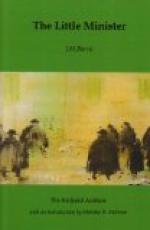I made small speed, not through lack of craft, but because one can no more drive in tackets properly than take cities unless he gives his whole mind to it; and half of mine was at the Auld Licht manse. Since our meeting six months earlier on the hill I had not seen Gavin, but I had heard much of him, and of a kind to trouble me.
“I saw nothing queer about Mr. Dishart,” was Waster Lunny’s frequent story, “till I hearkened to Elspeth speaking about it to the lasses (for I’m the last Elspeth would tell anything to, though I’m her man), and syne I minded I had been noticing it for months. Elspeth says,” he would go on, for he could no more forbear quoting his wife than complaining of her, “that the minister’ll listen to you nowadays wi’ his een glaring at you as if he had a perfectly passionate interest in what you were telling him (though it may be only about a hen wi’ the croup), and then, after all, he hasna heard a sylib. Ay, I listened to Elspeth saying that, when she thocht I was at the byre, and yet, would you believe it, when I says to her after lousing times, ’I’ve been noticing of late that the minister loses what a body tells him,’ all she answers is ‘Havers.’ Tod, but women’s provoking.”
“I allow,” Birse said, “that on the first Sabbath o’ June month, and again on the third Sabbath, he poured out the Word grandly, but I’ve ta’en note this curran Sabbaths that if he’s no michty magnificent he’s michty poor. There’s something damming up his mind, and when he gets by it he’s a roaring water, but when he doesna he’s a despizable trickle. The folk thinks it’s a woman that’s getting in his way, but dinna tell me that about sic a scholar; I tell you he would gang ower a toon o’ women like a loaded cart ower new-laid stanes.”
Wearyworld hobbled after me up the Roods one day, pelting me with remarks, though I was doing my best to get away from him. “Even Rob Dow sees there’s something come ower the minister,” he bawled, “for Rob’s fou ilka Sabbath now. Ay, but this I will say for Mr. Dishart, that he aye gies me a civil word,” I thought I had left the policeman behind with this, but next minute he roared, “And whatever is the matter wi’ him it has made him kindlier to me than ever.” He must have taken the short cut through Lunan’s close, for at the top of the Roods his voice again made up on me. “Dagone you, for a cruel pack to put your fingers to your lugs ilka time I open my mouth.”
As for Waster Lunny’s daughter Easie, who got her schooling free for redding up the school-house and breaking my furniture, she would never have been off the gossip about the minister, for she was her mother in miniature, with a tongue that ran like a pump after the pans are full, not for use but for the mere pleasure of spilling.
On that awful fourth of August I not only had all this confused talk in my head but reason for jumping my mind between it and the Egyptian (as if to catch them together unawares), and I was like one who, with the mechanism of a watch jumbled in his hand, could set it going if he had the art.




